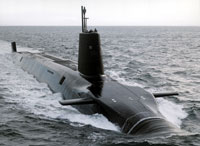The
Vanguard class are the Royal Navy's current nuclear ballistic missile
submarines (Ship Submersible Ballistic Nuclear or SSBN), each armed
with up to 16 Trident II Submarine-launched ballistic missiles (SLBMs).
The class was introduced in 1994 as part of the UK government's
Trident nuclear weapons programme.
The class includes four boats: Vanguard (S28), Victorious (S29),
Vigilant (S30), and Vengeance (S31), all built at Barrow-in-Furness by
Vickers Shipbuilding and Engineering Ltd between 1986 and 1999.
All four boats are based at Her Majesty's Naval Base Clyde (HMS
Neptune), 25 miles (40 km) west of Glasgow, Scotland. Since the
decommissioning of free-fall nuclear bombs in 1998, the Vanguard
submarines' Trident SLBM system is the UK's only nuclear deterrent.
The Vanguards were designed from the outset as an unlimited-range
nuclear powered ballistic missile submarine, unlike the previous
Resolution class which was adapted from the then existing Valiant
class and the American Lafayette class of nuclear powered fleet
ballistic missile submarines (SSBN in US terms).
At 149.9 metres long
and 15,980 tonnes submerged displacement the Vanguards are roughly
twice the size of the Resolutions, and are the third largest
submarines ever built, by displacement when surfaced, after the
Russian Typhoon and American Ohio classes. The great increase in size
is largely related to much larger size of the Trident D-5 missile as
compared to Polaris.
The Vanguards were designed and built at Barrow-in-Furness by Vickers
Shipbuilding and Engineering Limited (VSEL), now BAE Systems
Submarines. The Devonshire dock hall was built specifically to build
these submarines. The missile compartment is based on the system used
on the Ohio class, though only 16 missiles are carried rather than the
24 of the Ohio.
In addition to the missile tubes the Vanguard class is fitted with
four 21 inch (53.3 cm) torpedo tubes and carries the Spearfish
heavyweight torpedo, allowing it to engage submerged or surface
targets at ranges up to 65 kilometres (40 miles). Two SSE Mark 10
launchers are also fitted to allow the boats to deploy Type 2066 and
Type 2071 decoys, and a UAP Mark 3 electronic support measures (ESM)
intercept system is fitted.
HMS Vanguard, Victorious, Vigilant and Vengeance were commissioned in
1993, 1995, 1996 and 2000 respectively.
A new pressurised water reactor, the PWR 2, was designed for the
Vanguard class. This has double the service life of previous models,
and it is estimated that a Vanguard class submarine could
circumnavigate the world 40 times without refuelling.
This should
allow the class to carry out their entire service life without the
need for expensive refuelling. The reactor drives two GEC turbines
linked to a single shaft pump jet propulsor.
This propulsion system
gives the Vanguards a maximum submerged speed of 25 knots. There are
two Paxman diesel alternators and two turbo generators from WH Allen
for backup
|
VANGUARD CLASS Specifications |
|
Country of Manufacture |
United Kingdom |
|
Number in Service |
4 |
|
Crew |
14 officers and 121
ratings |
|
Armament |
16 x missile tubes capable
of firing Trident D5 SLBM missiles and 4 x torpedo tubes capable of firing
Spearfish Torpedoes |
|
Length |
149.9m |
|
Beam |
12.8m |
|
Draught |
12m |
|
Displacement |
15,980 tons submerged |
|
Powerplant |
Rolls Royce pressurised water-cooled reactor
supplying steam to two sets of General Electric geared turbines delivering
27,500shp to one shaft |
|
Performance |
Speed 25 knots |
|
First of Class |
1993 |

